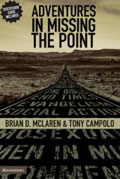 Paula, my niece, highly recommended the book Adventures in Missing the Point, by Tony Campolo and Brian McLaren. Each chapter deals with a different topic–Doubt, Sin, Women in Ministry, Homosexuality, the Environment, Evangelism, etc. The two authors each wrote half of the chapters and briefly commented on the other person’s chapters.
Paula, my niece, highly recommended the book Adventures in Missing the Point, by Tony Campolo and Brian McLaren. Each chapter deals with a different topic–Doubt, Sin, Women in Ministry, Homosexuality, the Environment, Evangelism, etc. The two authors each wrote half of the chapters and briefly commented on the other person’s chapters.
Since Paula recommended the book, as we stood in the Christian bookstore where she works, I bought it. I finished the book a few weeks ago.
Last night, I had supper with an old friend, We were talking about postmodernism and how much we bought into the assumptions about the fundamental attitudinal change which postmodernism insists is upon us. And so it’s inevitable that Brian McLaren’s name arose, since he’s the guru of postmodernism. My friend, Steve, suddenly asked, “Am I the only one who thinks McLaren is a boring writer?”
I thought I was alone. I breezed through Campolo’s chapters in Adventures in Missing the Point, but found myself continually bogged down in McLaren’s chapters. The contrast was spectacular. I ended up reading all of Campolo’s chapters first, checking them off in the table of contents, and then forced myself to read McLaren’s chapters, like downing cough syrup. Steve, my friend, had exactly the same experience.
Campolo’s chapter on homosexuality was some of the best writing I’ve seen on that subject; many of my questions found answers that lined up very satisfactorily. His chapters on women in ministry, the environment, and eschatology were also very good.
Sorry, but none of McLaren’s chapters seemed particularly insightful, though my copy of the book does show occasional underlines in his writing. And they certainly weren’t fun to read. (Paula found the chapter on “Doubt” very helpful to her, which is great.) Part of my problem with McLaren is that he looks at everything through the filter of postmodernism. I don’t think he could go to the bathroom without pondering how the urinal design reflects modernity. Since I don’t necessarily buy some of his basic assumptions, and yet he examines every subject in the book based on those assumptions being correct…well, that obviously creates a problem.
So do I recommend this book? I recommend half of it. Campolo’s superb. Skip the rest.





